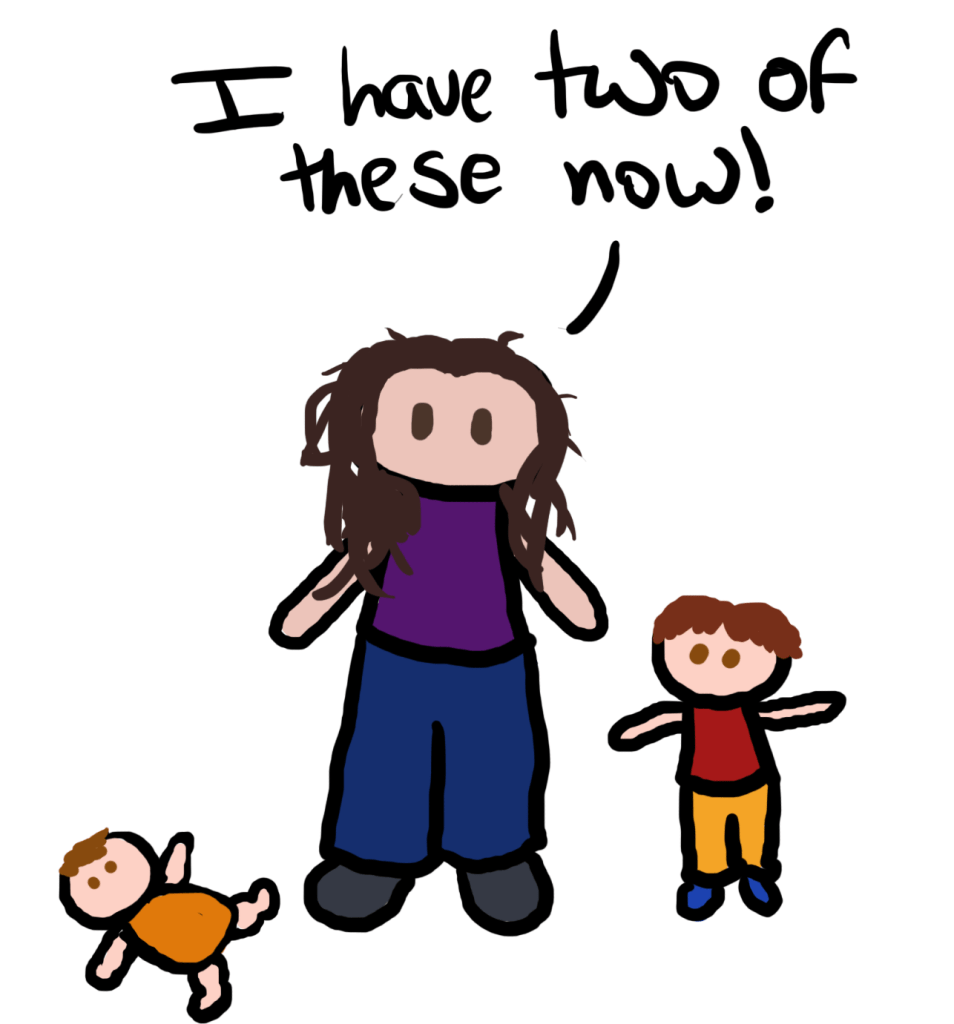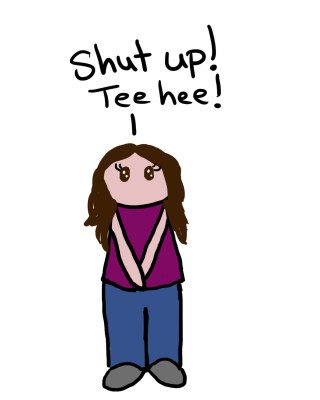Hey. I’m back. Let’s pretend I’ve been blogging for the last three years, okay? But if you’re curious: In my farewell post on November 8th, 2018, I said I would go back to blogging if my YA novel, Hellbound, ever got published. Don’t get your hopes up. It’s not being published… by a publisher. But it is being published by me. So I figured I’d share a little bit of the process.
A couple things have happened in my life. My second child, Ari, was born last August.

He’s doing well. Warren is now four years old, but is also somehow ten feet tall. I’m teaching virtual English and reviewing podcasts on Twitter (@BexGoos). And I also have my own podcast that I do with my husband (called Not Again!). Yeah… a lot going on.
So Hellbound. I decided to self-publish after I realized that going the traditional publishing route with this book was probably never going to happen. Even though I wrote it before Lucifer, and The Good Place, and the Hellboy remake… well, that’s all people will see now. Plus, people will probably lump this in with all those fallen angel novels that were popular for a while. For this and many other reasons, I decided to self-publish. With that in mind, I set out to reread Hellbound for the first time in years. And… yikes.
This is not me being self-deprecating, okay? I am genuinely surprised that an editor wanted to get this published at one point. The story is okay, but the writing… you can tell I wrote it when I was nineteen (twenty?). It’s quite juvenile. On top of that, I realized that I unconsciously wrote the novel as a brainwashed drone of the patriarchy. There were so many problematic aspects, and I actually had the gall to consider myself a feminist at the time.

I considered the book itself to be a feminist work! So I updated it as best as I could. The first thing I had to do was pull back on the patriarchal nonsense. Then I had to modernize it because a lot has changed in ten years. I find this stuff fascinating. Maybe I’m the only one? I’m just gonna list the things that had to change to address both of the aforementioned issues. The book will be on sale later this month!
To make it more feminist…
- Original: The two godlike deities that were echoes of humanity were both men. (I was like “Oo one of them is gay! Edgy!” God, twenty-year-old, me. Shut up.) Now: Tor remains male (as far as all-powerful godlike entities can have sex or gender). His sister Lux is a gay woman (Though, again, she is an all-powerful godlike being; she’s probably pretty open-minded when it comes to relationships).
- Original: Almost every woman who gave birth to a Re-du-Tor died in childbirth. Tor would literally just kill women with his penis. And I never once thought, “Should women be considered disposable?” Now: It’s a fluke that Aiden’s mother died in childbirth. All the other women who gave birth to Res-du-Tor “prayed” for such an encounter, seeing it as kind of an honor. Like being visited by a deity. It’s not a perfect fix, but I had to work with what my idiot younger self gave me.
- Original: I specifically noted that Aiden’s sister in her hellhound form looked “sleek and female.” Please be careful about rolling your eyes too hard. They might get stuck that way. Now: I took that piece of description out. Good Lord. I just deleted it. After I unstuck my eyes from being rolled back in my head.
- Original: Tor (Aiden’s father) had created some kind of replica or clone of Aiden’s mother? It was because he loved her and couldn’t stand the idea of letting her go, but the question of her free will was one that I did not give more than a second’s thought to. Now: I made her more of a shade than a clone, and I implied she existed because of her own will mixed with Tor’s love and loneliness. I also made it clear that Tor couldn’t actually touch her or be physically intimate with her. Again, not perfect, but… I worked with what I had.
- This doesn’t quite fall under the umbrella of feminism, but it still is important to admit how many subconscious biases were ingrained in me. I used to have a line that Nicolette looked like an “angel” with her “blonde hair and blue eyes.” I thought nothing of it for so long. And then one day, I reread it (this was actually years ago), and I was like… wait… Am I saying that I am pro-Aryan race? My grandfather was a Holocaust survivor for Pete’s sake! So I took that part out.
To modernize it…
- I removed all mention of Facebook, though I had to keep in some form of social media site. So I just made one up called ConnectMe. ConnectMe will never become obsolete because it doesn’t exist. Fun Fact: I reused it for a different book that will likely never see the light of day.
- I removed all mention of asking for directions and replaced it with using an app.
- I had to change Elysia’s alarm clock (yes, a physical alarm clock) to her phone.
- No one looks for the time anywhere other than their phone now, although I think they might still look at a clock if they are in a classroom.
- I removed some mention of listening to the radio since a lot of cars have Bluetooth or USB hookups for phones now. I know some people still listen to the radio, but it’s rare to see that exclusively.
- I had to take out a conversation about Trogdor, which broke my heart. I love Trogdor. But he is a reference the youths of today simply will not recognize.
- I changed the high school students’ physical paper notebooks to electronic tablets. Most schools have gone 1-to-1 on electronic devices by now. Pens and pencils are the way of the past.
- One of the main characters, Nicolette, got a part on a TV show. But streaming wasn’t a big thing at the time. Yes, Netflix and Hulu existed, but it would still be several years before people started “cutting the cord” entirely. So I updated it to her getting a part on a streaming show.
So that’s that…
Now I have to begin the arduous and cringey process of combing through the archives of this blog and unpublishing the posts that are not fit for human consumption.
Indie podcasts I’m listening to right now (the non-indie ones don’t need my help):
1. 10ish Podcast (To Ten Lists, Comedy, Fun Facts, Explicit)
2. The Green Horizon (Audio Drama, Sci-Fi, Comedy, Explicit)
3. Doomsday: History’s Most Dangerous Podcast (History’s Greatest Disasters, Graphic Content)
The Socials/Support Sites:
Find me on Twitter and Instagram @BexGoos
Buy Me a Potato
My Website: www.potatoladypodcastreviews.com
Everything else: https://linktr.ee/PotatoLady





